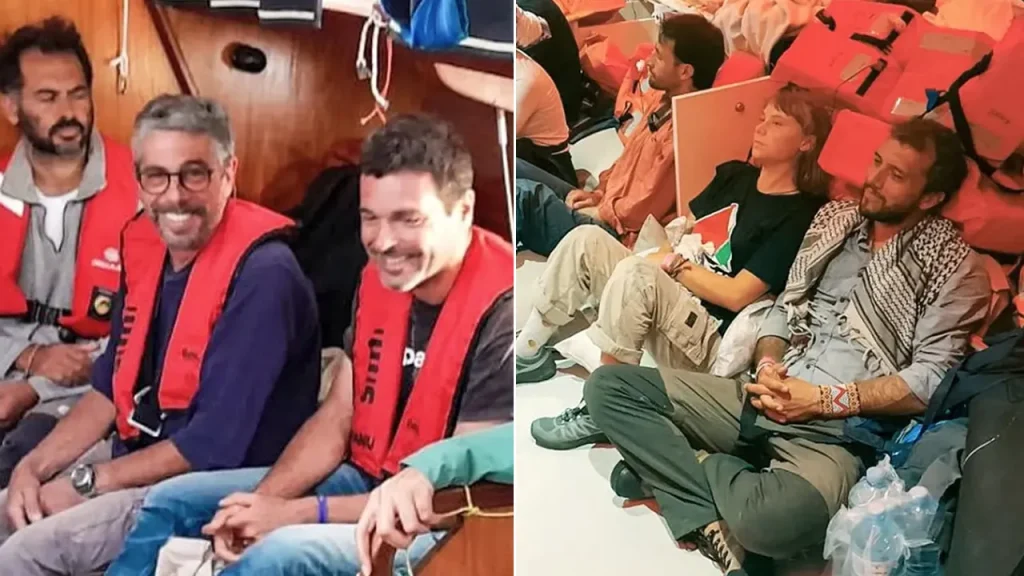Aid Flotilla to Gaza: Controversy at Sea During Yom Kippur
In a tense encounter on the high seas during Yom Kippur, Israel intercepted a 40-vessel convoy known as the Global Sumud Flotilla (GSF) that was attempting to reach Gaza. The flotilla, which included high-profile activists such as climate advocate Greta Thunberg and Nelson Mandela’s grandson Mandla Mandela, became the center of contradictory claims about its true purpose. Israeli officials released footage showing what they described as empty vessels, asserting that the flotilla carried no humanitarian aid but was merely a publicity stunt. “When we and multiple other countries offered them to take this aid and bring it to the Gazans — we could facilitate its safe arrival — they flat out rejected it, and now we know why: because it was never about bringing aid to Gazans, but it was all about the headlines and the social media followings,” said Israeli police spokesman Dean Elsdunne in a video as he walked through what was presented as an empty vessel. Prime Minister Benjamin Netanyahu praised the Israeli Navy for their “professional and efficient” interception, claiming they prevented dozens of vessels from entering an active war zone.
The Global Sumud Flotilla organizers tell a dramatically different story, insisting their ships were loaded with baby formula, food, and medicine intended for Gaza’s civilians. The organization called Israel’s actions “illegal” and described the detention of participants as kidnapping. “Intercepting humanitarian vessels in international waters is a war crime; denying legal counsel and concealing the fate of those seized compounds that crime,” the GSF stated. The group promised to release photographic and video evidence of the aid supplies on social media platforms. This conflicting narrative highlights the deeply polarized perspectives surrounding humanitarian efforts in the Gaza conflict, with each side accusing the other of misrepresenting intentions and facts. The GSF maintains that their mission was purely humanitarian, while Israel contends it was a provocative act without substantive aid to deliver.
The legal implications of Israel’s interception became another battleground of interpretation. Brian Cox, an adjunct professor at Cornell Law School and retired U.S. Army judge advocate, supported Israel’s actions, stating, “International law provides very detailed rules regarding the conduct of a naval blockade and the interdiction of vessels attempting to breach a blockade. Available evidence indicates Israel followed these legal obligations to the letter when interdicting the Global Sumud Flotilla.” Cox cited the San Remo Manual on International Law Applicable to Armed Conflicts at Sea, explaining that vessels attempting to breach a blockade can be legally captured outside neutral waters. This view was contested by former British diplomat Craig Murray, who questioned Israel’s jurisdiction and argued that the San Remo Manual represents outdated customary international law from three decades ago. This legal debate underscores the complex interplay between humanitarian concerns, security considerations, and international maritime law.
The detention and deportation process added another layer of controversy to the incident. Israel reported that four Italian citizens who were part of the flotilla had been deported, with remaining deportations being processed. “Israel is keen to end this procedure as quickly as possible,” the Ministry of Foreign Affairs stated. For Thunberg, this marks her second deportation from Israel; she was previously detained in June after participating in a separate Gaza-bound flotilla and chose deportation at that time, reportedly telling attorneys from Adalah, a legal center for Arab minority rights in Israel, that she could do “more good outside of Israel.” Adalah is now representing participants from the current flotilla, suggesting an ongoing legal challenge to Israel’s actions. The detention of international activists, particularly high-profile figures like Thunberg and Mandela, has drawn significant media attention and raised questions about freedom of movement in international waters and the right to deliver humanitarian aid.
The timing of the flotilla interception during Yom Kippur, the holiest day on the Jewish calendar, added emotional and symbolic weight to the confrontation. This timing may have been strategic on the part of the activists to maximize attention, or it may have been incidental to their humanitarian mission. Either way, it placed the Israeli forces in the position of conducting a military operation during a sacred religious observance, potentially intensifying the domestic reaction within Israel. The Italian Prime Minister Giorgia Meloni had previously warned that the flotilla risked escalation and could “blow up” potential ceasefire negotiations, suggesting that even governments not directly involved viewed the mission with concern regarding its potential impact on delicate diplomatic efforts in the region. The interception thus becomes not merely a question of aid delivery but a complex geopolitical event with ramifications for ongoing peace processes.
The Global Sumud Flotilla incident illuminates the profound humanitarian crisis in Gaza while simultaneously revealing how aid delivery has become entangled with politics, media narratives, and international law. For Palestinians and their supporters, the blockade represents an unconscionable collective punishment that worsens civilian suffering; for Israel, it’s portrayed as a necessary security measure to prevent weapons smuggling and terrorist activities. The stark contrast between Israeli claims of empty vessels and activist assertions of humanitarian cargo exemplifies the “truth gap” that characterizes much of the reporting and discourse surrounding the Israeli-Palestinian conflict. As deportations continue and legal challenges unfold, this maritime confrontation serves as a microcosm of the larger struggle over Gaza’s future and the international community’s role in addressing its humanitarian needs. The true contents of the vessels may remain disputed, but the incident has successfully drawn renewed attention to Gaza’s isolation and the desperate conditions faced by its civilian population, regardless of whether that was achieved through genuine aid delivery or, as Israel claims, through a calculated media strategy.


